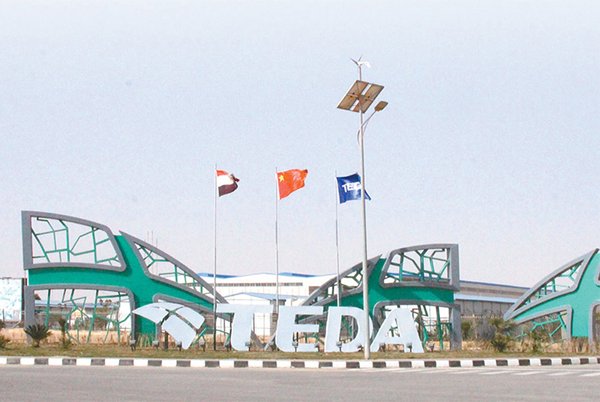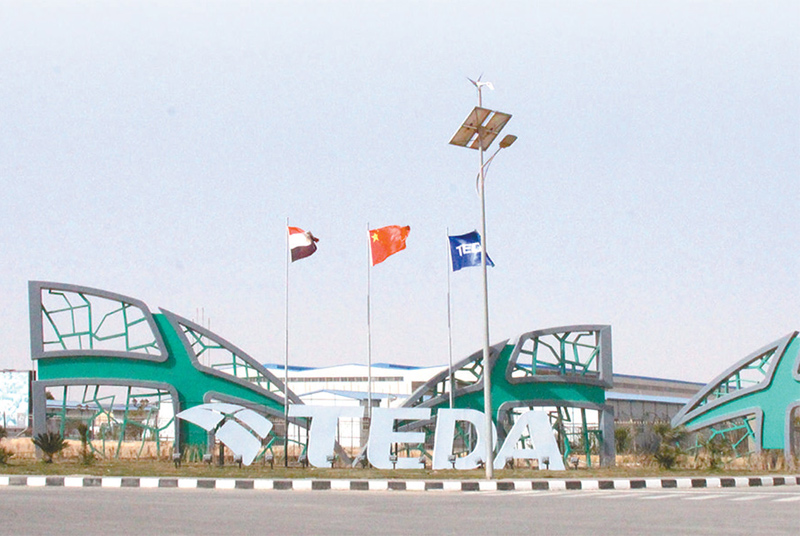Belt and Road Initiative Continues to Bloom in the Egyptian Desert
China-Egypt Suez Economic and Trade Cooperation Zone proves high water mark for bilateral development.

Chinese President Xi Jinping confirmed China's ongoing commitment to the continued construction of the China-Egypt Suez Economic and Trade Cooperation Zone (the Zone) at a meeting late last month with Abdel-Fattah al-Sisi, the Egyptian President. In the official Joint Communiqué of the Leaders' Roundtable of the 2nd Belt and Road Forum for International Cooperation, released following the Beijing event, the Zone was cited as an explicit example of the kind of "economic corridor" development the Belt and Road Initiative (BRI) was devised to nurture.
Indeed, the Zone, located in the Ain Sokhna district of Suez province east of Cairo, has become something of a landmark project and one seen as demonstrating the success of the Belt and Road Initiative, which ultimately co-opted the project. Construction work on the Zone officially started more than a decade ago – some four years before the BRI was officially launched – with the development headed by the China-Africa TEDA Investment, a subsidiary of the Tianjin Economic-Technological Development Area (TEDA), a highly successful mainland economic zone operator.
To date, the Zone has attracted nearly 80 enterprises, with investments totalling more than US$1 billion, while directly creating employment for more than 3,500 people and indirectly generating a further 30,000 jobs from businesses based in the Zone, the vast majority of which have gone to local workers. The Egyptian branch office of the China Hengshi Foundation Co, which specialises in manufacturing fibreglass fabrics, is one of the businesses now located in the Zone. Testifying to its success in generating local employment, the company's Vice President, Wang Shaijian, said: "We only have 25 Chinese workers, with the remaining 350 staff all Egyptian."
As of the end of 2018, the total output value of the Zone was about $1.2 billion, with some $56 million going to the Egyptian treasury in taxes, according to Liu Aimin, Chairman of China-Africa TEDA Investment Company.
The Zone is located about 120km from Cairo, close to the Suez Canal. It is serviced by the Ain Sokhna Port, which is currently being upgraded by the China Harbour Engineering Company. The construction of a new terminal is currently underway and scheduled to come into operation in the final quarter of 2019. From 2017 to 2018, container business at the port grew by 10% and its bulk business expanded from 30% to 40%.
In January 2016, work started on the second phase of the Zone, covering an additional six square kilometres. Infrastructure construction for two sq km of the second phase was finished in 2018, and according to Liu, eight industry-leading enterprises have already signed up, representing investment totalling $200 million. Chinese motorcycle giant Dayun Group is one of the investors and will officially start operations this year.
One of the early cornerstone investors operating in the Zone was China Jushi, a large producer of fibreglass, with investments totalling about $600 million. As the only fibreglass production base in Africa, the company earned $180 million through exports for Egypt in 2017, and has created trade volumes of more than $5.8 million for both local upstream and downstream industries.
Last year, Jushi's new production base, which has a capacity to manufacture 200,000 tons of fibreglass annually, went into service making Egypt the world's third-largest fibreglass producer. The company has also created more than 2,000 jobs for Egyptians and paid about $16.8 million in taxes to the country's treasury and more than double that figure in customs duties over the past four years.
Another successful project is the TEDA Fun Valley amusement park. Built at an estimated cost of $5.6 million, it opened in April 2015 with the primary purpose of entertaining the families of those working in the Suez Economic and Trade Cooperation Zone. Since then, however, it has proven to be a big hit with local and international tourists and now attracts thousands of visitors a year. With tourism comes demand for transportation, accommodation and food and beverage services, providing further opportunities for local businesses.
Marilyn Balcita, Special Correspondent, Cairo





